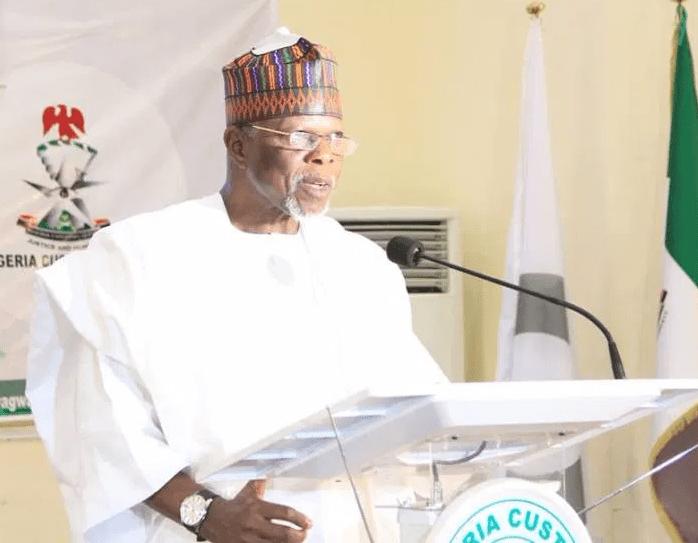Customs Report
E-Valuation: Customs Declares Service Has Robust Internal Mechanism

…Debunks Mutual Understanding with CBN On Controversial Policy
BY EGUONO ODJEGBA
The Nigeria Customs Service, NCS, has debunked insinuations that the service maintains a common understanding with the Central Bank of Nigeria, CBN, on introduction of the of the e-valuator and
e-invoicing for import and export businesses by the apex regulatory bank.
In a statement by the Customs Public Relations Officer, Deputy Comptroller Timi Bomodi on behalf of the Comptroller General, Col. Hameed Ali, Rtd, said the customs maintains a functional up to date internal valuation system for both import and export, that is in tandem with the essential dynamics of valuation supported by the World Customs Organization, WCO.
According to the Customs, the introduction of the new policy by the CBN has faced huge condemnation and protests by stakeholders, and lamented that whereas the Customs should be the final authority on the issue of valuation, the CBN embarked on the introduction of the policy without first seeking it’s thoughts.
Bomodi notes that the CBN and Customs must sit down to review the policy to seek a middle of the road approach not only to make it acceptable to stakeholders, but indeed, meet global trade best practices.
The statement reads: “It has come to our attention that there are reports, suggesting the Nigeria Customs Service (NCS) has acquiesced to the introduction of the e-valuator ande-invoicing for import and export businesses in Nigeria by Central Bank of Nigeria (CBN).
“We wish to state that this is incorrect. The Service still stands by its earlier submissions on the matter, as was clearly communicated to the House of Representatives Joint Committee on Customs and Excise, Banking and Currencies on 03 March 2022.
“It will be recalled that the Central Bank of Nigeria (CBN) in a letter dated 8 July 202l informed the Nigeria Customs Service (NCS) that they were deploying a mechanism for verification of prices of goods before allocation of forex at the point of e-form M registration.”
Bomodi said the policy which in summary seeks to benchmark the price of imported and exported cargo has however raised objections from critical stakeholders within and outside the industry who have expressed valid concerns that require critical considerations.
“The practice world over is to domicile adjudication on Customs values for import and export within the Customs administration of every country. The NCS, undoubtedly, is alive to its statutory functions and has a vibrant Valuation Unit under the Tariff and Trade Department whose roles among others includes- the proper interpretation of WCO/WTO rules and agreements concerning the valuation of goods.
“Nigeria being a member of the World Customs Organization (WCO), World Trade Organization (WTO) and also signatory to international trade treaties, including Article VII of the General Agreement on Tariffs and Trade is constrained to abide by the principles contained therein.”
He further explained that e-voicing policies of every country must at all time fit into the global trade conventions and protocols.
“The Article VII stipulates that the value for customs purposes of imported/exported goods should be based on the actual value paid or payable for them. This is commonly referred to as transaction value. This agreement also prescribes five other methods for arriving at Customs value where the transaction value is unacceptable.
“They are transaction value of identical goods, the transaction value of similar goods, Deductive value method, Computed value method, and Fallback method, applied sequentially. The NCS as a government agency aligns with the WTO Agreement on Customs Valuation (ACV) as it aims for a fair, uniform and neutral system for the valuation of goods for Customs purposes.
“This conforms to commercial realities, and outlaws the use of assumed values for customs purposes. It is our view that the use of benchmarking in valuation as proposed by the CBN policy will negate the aim of the ACV and result in disputes, delays and uncertainties.
“The WTO Trade Facilitation Agreement (TFA) remains the Service’s principle guide for trade facilitation. Therefore, NCS is always seeking new approaches to enable the expedited clearance of goods from our ports by adopting new technologies, harmonizing and simpliflying our procedures all of which is purposely designed to reduce cost.”
The Customs notes that it would be further guided by the inputs of the relevant aspects of the parliament who also have a say in the matter.
“The House of Representatives Joint Committee on Customs and Excise, Banking and Currencies had directed that all agencies with defined roles in the supply chain meet to harmonize procedures with particular reference to resolving the issue of value for trade purposes.
“This meeting is yet to take place, therefore there could not have been any agreement supporting the CBN initiative as reported in the news.
“We look forward to the robust deliberation that is expected to occur from this meeting as directed. Until then we shall continue to abide by the principles as contained in the ACV for all import/export transaction.”




























